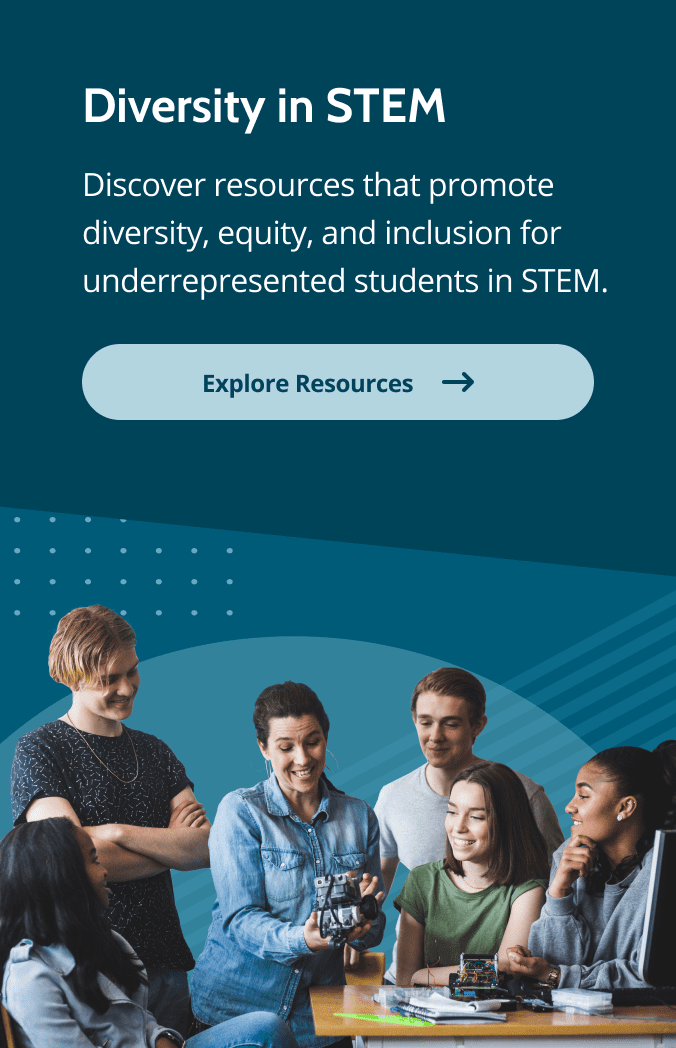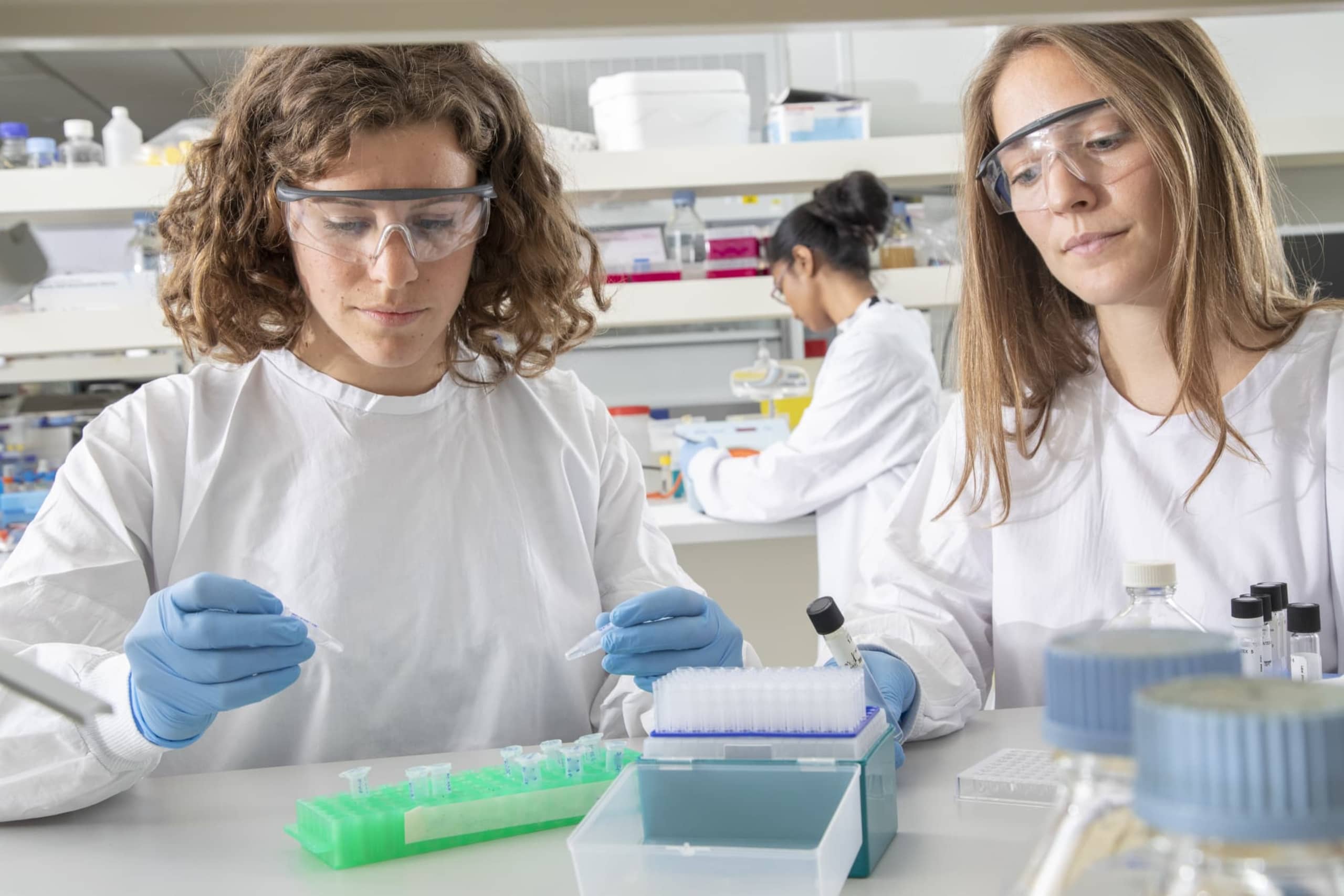One Student’s Path Into STEM as a Black Woman
Damilola Awofisayo, a first-year student at Duke University, wanted nothing to do with science, technology, engineering, and math (STEM) when she entered high school. Being from Nigeria, access to electricity was unreliable, and she had little exposure to learning tech.
But Awofisayo’s high school counselor signed her up for a computer science course that would spark her interest in technology — she founded her own hackathon, an event where computer programmers come together to engage in rapid and collaborative engineering over a relatively short period of time to work on projects. She also created apps and won an award from Apple.
I really liked the idea of having a tool to use for solving a lot of the problems I saw in my current society and back in Nigeria,
Awofisayo said. Computer science was kind of my tool to be the change I wanted to see.
Gender and racial gaps exist in STEM industries worldwide. Unequal opportunities in education, a lack of academic and social support, and discrimination have created an industry that underrepresents Black women.
But, with the right exposure and mentorship, Awofisayo knows firsthand that young Black women are empowered to enter STEM fields.
What It’s Like Being a Black Woman in STEM
Throughout history, Black women have pursued careers that uplift their communities and STEM industries. They invent life-saving and life-changing technologies and lead teams of researchers developing incredible advancements in STEM.
However, many have not received their due recognition. And their contributions have gone unnoticed over the years.
Awofisayo weighs in on what being a Black woman in STEM is like.
Imposter Syndrome Is Real
As Awofisayo describes it, being a Black woman in STEM has been really daunting.
In her first computer science class, the students were asked to turn on their computers. Every computer turned on except for Awofisayo’s.
As the only Black woman in the class, she automatically thought she was the only one in the class who couldn’t turn on a computer. As it turns out, her computer had been unplugged. But the moment stuck out as the start of feelings that arose by being the only Black woman in the class.
I immediately just thought, ‘Maybe I’m not meant for this,’
Awofisayo said. It’s just the idea of being the only person from my background. Whenever I don’t know how to do something, it automatically brings me back to thinking everyone knows this except for me.
Being a Minority Is Hard — to Say the Least
As the National Science Foundation notes, women make up just 34% of the STEM workforce, as of 2019 — despite making up about half of those employed in the United States. For Black women, the numbers showcase an even smaller percentage.
According to a Pew Research Center study published in 2021, Black employees account for just 9% of the STEM workforce. And Black women ages 25 and older earned the lowest median annual STEM salaries ($57,000, which is tied with Hispanic women). In comparison, according to the Pew study, the median annual salary for Asian workers ages 25 and older is 127% of comparable white workers, or about $99,100.
The National Center for Education Statistics identifies that Black women accounted for low percentages of STEM degree earners in 2019-2020.
Despite Black women being underrepresented in the STEM industry, students like Awofisayo continue pursuing STEM degrees and careers in earnest.
The first time you’re going into STEM is going to be hard because finding people who don’t look like you is pretty scary, but just think about the impact you can have as one of the first or only people that have your perspective,
Awofisayo said.
Your Experience Is Bigger Than You
In addition to being underrepresented, Awofisayo shares that being a minority in STEM can also mean your actions inadvertently represent those of your whole community.
You feel like you’re not only representing yourself, but also where you come from, which is really hard,
Awofisayo says.
Recognition Matters
As she continued pursuing STEM learning opportunities, Awofisayo identified that being recognized by her male peers was very important to her. She believes that the more recognition Black women in STEM receive for their talent and work, the more motivated they can be to push forward.
Being able to have that validation from someone who doesn’t come from the same background as me, someone who I see as very smart and accomplished, it was really encouraging for me,
Awofisayo said.


How She’s Paving Her Way in STEM
Awofisayo took AP STEM courses to hone her skills. Outside of school, she participated in coding courses, hackathons, and STEM summer camps.
During a hackathon at the Massachusetts Institute of Technology, she and her friends created an image recognition app that detects hand gestures to help people learn American Sign Language. She went on to develop Plantry, an app that helps mitigate food waste. Plantry helps farmers and gardeners track plant growth, detect plant diseases using image recognition, and provide recipe suggestions.
I think computer science has the power to change a lot in society and empower a lot of communities,
Awofisayo said. I hope to start a company focused on ethical practices in computer science and creating technology that’s not only ethical but also accessible and efficient.
Awofisayo is now pursuing a career intersecting computer science and community empowerment. At Duke University, she’s double majoring in computer science and public policy.
Advice for Black Girls and Women in STEM
Awofisayo shares a few specific points of advice for Black girls and Black women in STEM.
 Remember, You’re Not Alone
Remember, You’re Not Alone
You do belong in this field, and there is space here for you,
Awofisayo said. There are a lot of problems that you can only really know if you experience them, so having more people from diverse backgrounds — especially Black women — in STEM, you see a shift in the problems that are being looked at and the ways they’re being solved. So your perspective is really unique and can help a lot of people.
 Attend Hackathons
Attend Hackathons
We need to provide more resources, mentorship, and opportunities for that growth and problem-solving,
Awofisayo says. I see hackathons as a really great way to do that because you can achieve all three at once. There are a lot of mentors at hackathons, competitions where people can push themselves, and you’re meeting a lot of people — sometimes from all around the world.
Awofisayo co-founded TecHacks, a nonprofit student hackathon organization. TecHacks helps create supportive communities of girls and nonbinary individuals coming together to code and problem-solve.
TecHacks started putting on hackathons to connect girls from around the world with mentors from places like Google Cloud, Microsoft, and startups. Awofisayo believes this is one of the best ways to get more women of color in STEM.
 Seek Mentorship
Seek Mentorship
Awofisayo connected with Gabriela Gresenz, a software engineer at Apple, for advice on her college choice. She said chatting with Gresenz helps her think about where she can see herself in the future.
In high school, Gresenz started teaching kids coding because she wanted to show young girls that computer science is a woman’s space, too. She said having a mentor who’s down to have the hard conversations about what it’s like being a woman in STEM is crucial.
We won’t see change in the gender balance unless we act as role models and mentors for the women entering the space,
Gresenz said. Making them feel supported, having those hard conversations, making them know they’re not alone — that this is something that is a universal experience, it’s a network that keeps you strong living in the space of STEM.
Gresenz says mentorship is a two-way street, and watching Awofisayo succeed inspires her.
There’s nothing like watching other women put their foot down in the space and make a name for themselves,
Gresenz said. She’s so passionate and invested in all of the things she’s interested in, and she’s going to do them all.
 Challenge Yourself
Challenge Yourself
In 2021, Awofisayo won the Apple Worldwide Developers Conference’s Swift Student Challenge. She learned more about coding and connected with hundreds of young STEM students from around the world.
Awofisayo developed an app to support the dyslexic community in Nigeria. The app offers resources to teachers to better understand living with dyslexia and how they can help. It also provides students with dyslexia fun, research-based games to build letter recognition and reading skills.
 Remember That You’ll Be the Change
Remember That You’ll Be the Change
Representation of Black women in STEM continues to grow. As more Black women access STEM education and enter related career fields, younger generations see the changes — and representation matters.
As Awofisayo states, It’s also encouraging to see that, even though we’re not represented in the field now, I can be one of the people to change that.


With Contributions From:

Damilola Awofisayo, a first-year student at Duke University, has always had a mission of expanding access to education in science, technology, engineering, the arts, and mathematics (STEAM). She started her own hackathon called TecHacks, a nonprofit with a mission to bridge the gender gap in STEAM by building a supportive environment for young women and nonbinary individuals everywhere to create, problem-solve, and showcase their talents. She also recently coded an app for the Congressional App Challenge entirely on Swift and inspires other young women to learn to code through workshops and fellowships.




